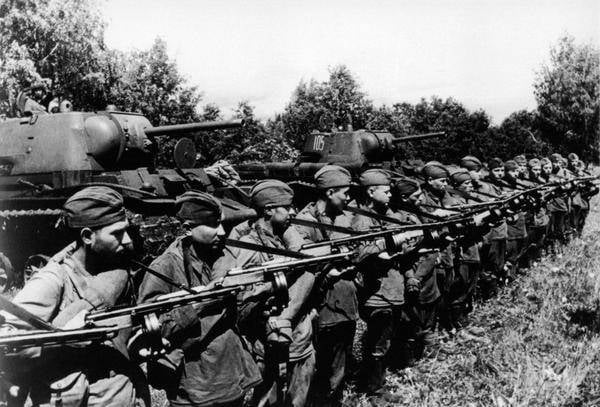Liberal myth about fines
The rest of the army, apparently, only got confused under the feet of the penal battalions (from criminals and political prisoners). According to the “Shtrafbat” film, penalty boxers then cut each other, then rob warehouses, play cards and fight between them.

Penalty battalion. 1943 year.
Penalty units (companies and battalions) were created according to the order of the People’s Commissariat of Defense No. 227 from 28 in July 1942 of the year (in the Wehrmacht, the penalty units were created back in the 1941 year). The fronts created 1-3 penal battalions of 800 men, formed them from guilty commanders and political workers of all branches of the military. Service in such units gave them a chance to atone. In the army formed penal companies - 5-10 (number of 150-200 people), they were formed from junior commanders and privates.
Penalties could be released before the deadline - for military distinction (for a particularly outstanding military distinction, they also presented themselves for a state award), as well as those wounded (redeemed with blood). In the penalty parts were sent for a period of one to three months. After liberation, they were fully restored in their rights and rank. Families of the victims were given a pension on a general basis, without prejudice. Those who became injured after injury received a pension.
Those serving in the penal units were divided into fixed and variable composition. The permanent composition was formed from the best commanders and political workers who distinguished themselves in battles. For special conditions, they received certain benefits. The permanent staff, in addition to the commanding staff, also included scribes, medical orderlies. In the companies, a permanent commander, a military commissar, a clerk, commanders, political instructors, petty officers, and platoon sanitary orders were included in the permanent composition. Variable composition - this is the penalty box, who served as privates. They could be appointed and junior commanders.
In addition to the guilty soldiers, people convicted by the judicial system also got into the penal units. A person fit for health, who committed such crimes as counterrevolution, banditry, robbery, robbery, theft, multiple deserters could be sent to the penalty box. For such penalties the term of stay in the unit was determined by the commander. But it must be remembered that they only got into the penalties, only guilty commanders and political workers served in the penal battalions.
The total number of fines, their losses
In total, 65 penal battalions and 1037 penal companies were created during the war. But this is not a constant number, some parts have existed for a year, others for several months, two months. That is, the number of simultaneously existing parts is significantly lower. So, in 1944, the number of battalions ranged from 8 to 15, the number of companies ranged from 199 to 301. The average monthly number of penal officers in the battalion was 225, in a company - 102, and the total average monthly number in all penal battalions and companies - 27326 people. For example, in the army in the same period 6550 thousand people, the proportion of penalty from the army less than half a percent.
In total, 1942 people were sent to 1945 through 427910 for the war (from signing the order that created the penalty units), and 34 million 476,7 thousand people passed through the armed forces, that is, the percentage that passed the 1,24% penalty parts. It turns out that their contribution to the Victory is rather modest.
Loss of penalty box is quite high, as they were assigned, as a rule, the most difficult combat missions. In 1944, the penalty units suffered losses in 3-6 times higher than the same units, in the same offensive operations. Monthly average losses reached 10506 people dead, wounded and sick in variable composition and 3685 people in the permanent.
But it cannot be said that they were all “cannon fodder,” it was a war. There were cases when a person got into the penalty part for the second and even the third time and lived to the end of the war.
Armament, uniform
Films often show penalty boxes in rags, poorly armed, often with Germans taken from them. weapons. This is not true. So, the commander of the company 8-th separate penal battalion 1-th Belarusian Front (from a permanent composition, that is, not a penalty box) A.V. Pyltsyn, recalls that everyone was armed with PPD pistols, and then PPSh, rifles, carbines. The penal battalions had mortar and machine-gun companies. Pomegranate was a complete set, they took as much as was necessary. A.V. Pyltsyn: "And all these tales about the fact that the penalty box was sent into battle without a weapon, it's all naked and intentional lie." Outfit penalty box did not differ from other fighters.
Sources:
Halder F. Military Diary. M., 1971.
Mezhenko A.V. Prisoners of war returned to service ... // Military-Historical Journal. 1997. No.5.
Orders of the People's Commissariat of Defense of the USSR: June 22 1941 - 1942 g. Comp. Barsukov A.I. M., 1997.
Pyltsyn A.V. Penalty strike, or as an officer's penal battalion reached Berlin. SPb., 2003.
Russia and the USSR in the wars of the 20th century: Statistical research. M., 2001.
Information